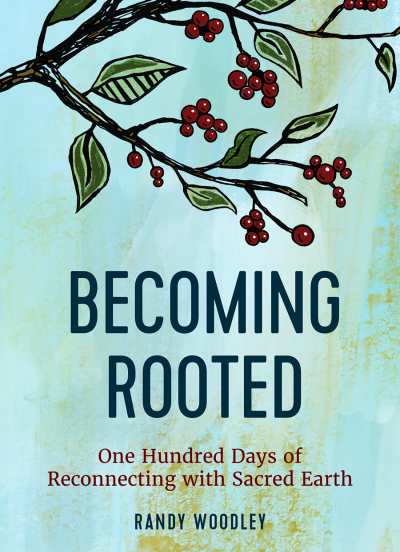Reviewer Rachel Jagareski Interviews Randy Woodley, Author of Becoming Rooted: One Hundred Days of Reconnecting with Sacred Earth

In this week’s interview, Randy Woodley opens our eyes and hearts to Christian spirituality as seen and understood by Native Americans. Of utmost importance, he says, is that many Indigenous people view Jesus and his teachings as separate and unique from Christianity—“In many ways,” he says, “I think our Indigenous worldview is much closer to Jesus’ than Western Christianity, and we understand him better.”
At a time when more than a few Christian leaders are being called out for their exclusionary and intolerant political positions and support of autocratic-leaning politicians in this country and around the world, we couldn’t be more thankful to Randy for providing a good stark reminder of who Jesus was, why he attained prophet status, and how all of us could scarcely find a better way to live our lives than his example.

Don’t miss Rachel Jagareski’s review of Randy’s Becoming Rooted from Foreword’s January/February issue.
Becoming Rooted impressively distills Indigenous philosophy and cultural practice about our connections with the natural world. Your introduction notes that you were not raised with much Native American culture. When and how did you begin this education?
Being assimilated was the norm in my community for people with Native American ancestry, including my parents and many of their friends. I decided early on, maybe in the 5th grade or so, that I would spend my life seeking a more authentic expression of what it means to be Indigenous. A lot of the friends I chose and direction in my life was towards that end. As I hung out with more and more Native people throughout my years, I discovered there were a lot of those Indigenous values that my parents and others retained without ever having to teach them, they were caught, more than taught.
How does your background as a Christian pastor dovetail with your Indigenous spirituality? What are some of the communalities? And the differences?
Western Christianity is not compatible with Indigenous values but the teachings of Jesus are. Western Christianity has proven too many times its inability to live up to the values of Jesus. My wife and I have not considered ourselves Christians for well over a decade but we are Indigenous tradition-keepers who follow Jesus. When one reads his stories, it’s easy to see why our Indigenous people can relate to Jesus. His values are very similar. His purpose to convert people to a more harmonious way of living is what all great Indigenous leaders have taught. The Western worldview does not understand story well but Indigenous people do. In many ways, I think our Indigenous worldview is much closer to Jesus’ than Western Christianity, and we understand him better.
I enjoyed the many quotations in your book. Who are some of the writers that have most influenced your work? Any notable writers or titles that you are currently reading?
John Mohawk, a traditional Seneca elder who has passed on, has had more impact on me intellectually than probably anyone else. I, like him, am also a farmer. I used to read The Akwesasne Notes in high school when he was the editor. Later I read his books and watched a number of video interviews, etc., he did. Regretfully, I never got to meet him. A Maori Christian intellectual named Winkie Pratney was also very influential in my life. I love to read people like Pratney who are innovative and understand there is no box or categories that we must retain, but are willing to dream while knowing their dreaming is still possible reality. Also, a Keetoowah story-teller, who has passed, Robert J. Conley, is someone with whose writings I have spent many hours and have learned to appreciate at many levels. A few books, like Jack D. Forbes’ books or Charles Mann’s 1491 and 1493 are really exciting to read when thinking about our country’s history long before Columbus (BC).
Many of your 100 steps in reconnecting with the Earth emphasize being outdoors and observing and exploring the sacredness of specific local territory. Can you expand upon ways that apartment dwellers and urbanites might do this?
Stay connected, not just by getting out and going to a park or for a hike, but stand around in your neighborhood and see what’s happening. Set up a chair by your window. Grow a vegetable like a tomato plant, on your patio or in you home. Share it. Collect the seeds and plant again and share those. Join a community garden project or CSA. Stay connected!
“Realizing the American Dream is an Indigenous Nightmare” is a powerful section. You recommend reading books by Indigenous authors and about ancient and Native cultures, as well as creating alliances with Native people. What are some concrete actions one can employ today and in the long-term to create this allyship?
One path would be to first educate yourself about the land with which you live. Who are the Host peoples? Where are they now? What are they doing? What are their issues? What rights are they still fighting for? Attend their cultural events. Perhaps a cultural guide will eventually appear and a relationship may be formed. Always remember, as an ally, you are a “junior partner.” Be helpful without being a burden. Ask questions only when they are welcomed. When they say you are ready, start educating the people around you who are still clueless. Eventually, lead your non-Indigenous friends into actions in support of the earth and those particular Host Peoples. Then start to look at the larger issues and be an advocate for Indigenous people’s rights and the rights of the earth.
Dominant Western culture values individualism, aggression, and consumerism, running counter to Indigenous values of humility, listening, and sharing. During these pandemic years I am feeling more hopeful about a shift toward the latter, hearing more of an emphasis on kindness and respect for diverse voices and the environment in popular media and among the younger generation. Do you agree? Do you think we are at a tipping point in our social values as the climate crisis accelerates?
Absolutely! I think the Millennials and Gen Z hold the keys to much of our healing society and the planet. They are tossing out the conventional systems that promote so much harm in the world and showing up to create new systems. They are still learning how to use their power.
They need guidance for sustainability, but I see the possibility of major cultural shifts possible if we make room for them to lead us.
Rachel Jagareski
